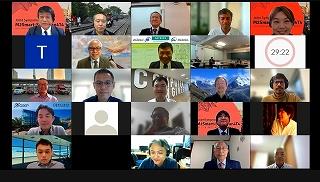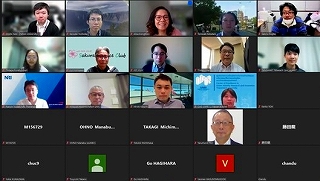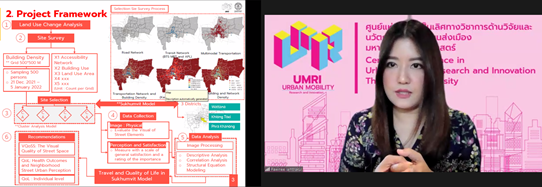Japan-Thailand-India Joint Symposium for a Low-Carbon Society
On 25 January 2022, the Project for smart transport strategy for Thailand 4.0, in collaboration with a project in India, organized a joint symposium with Japanese, Thai and Indian research institutions, with the aim of realizing a low-carbon society. Both projects’ objective is to propose smart transport strategies to promote well-being in cities, with solutions for serious traffic congestion, using the latest information and communication technologies. The symposium aims at exchanging knowledge between two projects, discussing and seeking a roadmap to deliver research outcomes to society and building a new research network. The online symposium consists of four sessions: introduction, evaluation and future vision, data collection and analysis, followed by a panel discussion addressing the challenges ahead. In total, 114 participants were invited, consisting of researchers from both projects, students, JICA, JST and related delegates from the public and private sectors.


Researchers from the Indian project, “The Project for Smart Cities for Emerging Countries Based on Sensing, Network and Big Data Analysis of the Multimodal Regional Transport System” (M2Smart), introduced activities and presentations were delivered by associates of the Indian Institute of Technology in Hyderabad, the Nagoya Electric Works and Nihon University. They have developed traffic sensing technology on crossroads using high resolution CCTVs and drones, enabling the detection of various types of vehicles, such as a rickshaw and comprising big data analysis, high-end network technology and a traffic management tool with an electric signboard, namely, the “Variable Message Sign (VMS)”. They applied these technologies in the city of Ahmedabad, with the aim of proposing a guideline for smart city.
The principal investigator of the project in Thailand, Prof Hayashi (Chubu University), outlined how this particular project is developing a smart transport strategy to enhance the quality of life (QOL). Subsequently, Dr Pawinee from Thammasat University presented a method of evaluating QOL to propose a policy package, namely the “Sukhumvit Model”, as a component in the smart transport strategy. An approach for developing a future scenario and draft scenarios for the Sukhumvit Model was presented by Dr Apiwat from Chulalongkorn University.



Delving into the technical elements, Dr Witsarut of Chubu University elaborated on one of the ICT tools of the project, aimed at enhancing citizens’ QOL, QOL-MaaS, which allows proposing better activities for them during the day. Next, Prof Doi from Osaka University showed the progress of an electric car experiment, the Smart Small Vehicle Service (SSVS), trialled in the Sukhumvit district of Bangkok. Regarding computer modelling cases, firstly, Dr Pittipol of Chulalongkorn University demonstrated a QOL scoring with an AI image recognition model. Secondly, Dr Varameth of Kasetsart University introduced both current and previous microsimulation models on land use and transport in Bangkok. To integrate these tools into a visual platform, Prof Fukui of Chubu University introduced a proto-type of a 3D interface, namely the Digital Earth System, to assist people’s lifestyle changes and the work of urban-transport decision makers.




During the panel discussion relating to challenges ahead, Prof Hayashi emphasized that the project is going to propose sufficiency rather than efficiency, of which the index can be calculated by dividing happiness or the QOL value by the toll on the environment or the carbon emission rate. To this end, Prof Hayashi proposed a clear approach, targeting citizens and policy makers, respectively. On the other hand, the principal investigator of M2Smart, Dr Tsuboi, prioritized on making things happen, rather than focusing on the physical elements in the field, toward the end of the project phase.

The project director, Prof Thanaruk from Thammasat University, suggested a challenge for Thailand to become actively involved in the AI area beyond countries, to evaluate the post-COVID era and to carefully consider the pros and cons of innovative technologies. The last panellist, Dr Apiwat, suggested three common keywords for both projects to tackle: climate change, technology disruption and inequality. Dr Apiwat believed that the first two issues are likely to be covered by the projects, however, inequality is a critical issue for both countries. Since there are many who are unable to access an advanced digital service, for reasons of inequality, such as poverty, Dr Apiwat proposed that such social gaps should be considered when developing new technologies, otherwise, he warned that the QOL of society would not be enhanced.
In the closing comments, Prof Kamimoto, the principal research supervisor in the environment and energy sector of JST, suggested that it is important for researchers to reach out to stakeholders from the policy sector and to explain complicated, scientific outputs in an understandable context. Through the symposium, it seems that a new research network has been strengthened and that the new network appears motivated to expand the new project horizontally across Asia.